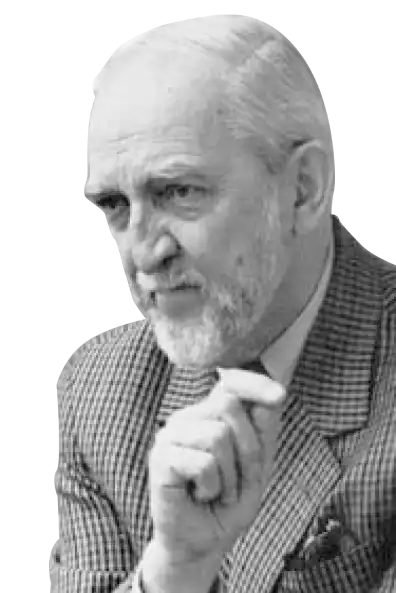

menu
search
Biography
Schaeffer reveals the workings of contemporary music, its ‘system,’ combining traits of Cage, Stockhausen, Kagel, Penderecki, and… Schaeffer—Bogusław Schaeffer himself.
Bogusław Schaeffer
(b. June 6, 1929 in Lviv, d. July 1, 2019 in Salzburg) was a Polish composer, musicologist, playwright, graphic artist, philosopher, and teacher. Having studied composition under Artur Malawski at the State Higher School of Music in Kraków, and musicology under Zdzisław Jachimecki at the Jagiellonian University, in 1959 he completed his formal musical education, learning from Luigi Nono. He himself taught composition at the Academy of Music in Kraków and at the Hochschule für Musik und Darstellende Kunst ‘Mozarteum’ in Salzburg.
In addition to music, his output includes drama. Author of about forty plays altogether, repeatedly staged in Poland and abroad and translated into more than a dozen languages, he personally directed some of them. His graphic scores, related to music to a varying degree (and to a small extent to drama), have been exhibited in galleries around Europe and the United States. A modern man of Renaissance, a classicist and an avant-gardist at once. An impostor, a trickster, and a genius at that. An esteemed professor, and at the same time an outsider. A composer who has both developed a cult following and faced seclusion. He reminisced: ‘Mister Kazimierz Serocki and Mister Jan Krenz visited me, my wife, and our one-year-old child in the tiny room that we had gone to so much trouble to rent. They were simply delighted that Schäffer (sic!), who wrote about new music, could compose too’. And vice versa, one might add. Schaeffer’s interdisciplinary oeuvre is a repository of threads of modern art seen as tradition in a constant state of emergence.
Music lovers, composers and musicians, the youngest ones included, could thus proclaim: ‘Schaeffer is us!’
Bogusław Schaeffer’s Spring Music for viola (D. Stanisławska) and piano (A. Manijak)
610
Compositions
233
DRAMAS AND OTHER TEXTS
91
Graphics
About Schaeffer
Bolesław Błaszczyk,
cellist in the MozART group
Monika Pasiecznik,
critic, curator
Marek Frąckowiak,
founder of the AUREA PORTA Friends of the Arts foundation
Patryk Zakrocki,
musician
Awards and distinctions
1959, 1964 - awards at the Grzegorz Fitelberg Competition; respectively for Monosonata for six string quartets (1959) and Quattro movimenti for piano and orchestra (1957), and Little Symphony: Scultura for orchestra (1960) and Collage and Form for 8 jazzmen and orchestra (1963).
1962 - award at the Artur Malawski Competition; for Musica ipsa for orchestra of low-pitched instruments (1962) and Four Pieces for string trio (1962).
1971, 1972, 1980, 2001 - Award of the Minister of Culture and Art.
1977 - Award of the Polish Composers’ Union, Award of the City of Kraków.
1987 - award at the Festival of Polish Contemporary Plays in Wrocław; for dramaturgical work.
1998 - Alfred Jurzykowski Foundation Award.
1972 - Knight’s Cross of the Order of Polonia Restituta.
2013 - the Meritorious for Warsaw distinction.
2019 - Grand Cross of the Order of Polonia Restituta; for outstanding achievements in the field of culture (posthumously).
External links
Schaeffer Non Stop
Schaeffer Non Stop is a unique mobile application based on one of the most famous graphic scores by Bogusław Schaeffer.
Take a look at the Schaeffer Non Stop app
People won't devote even 5 minutes a week to keep their mind in shape. Whereas they crawl into the worst smelling holes to keep their metabolism in order, spending a substantial part of their life there. Life is just that way. Unappetizing. Based on appetite, though.
Aurea Porta - Friends of Art Foundation
The Friends of the Arts AUREA PORTA Foundation was founded in 2001 by Marek Frąckowiak (a schaefferian actor). Krystyna Gierłowska, its creative director, and Ewa Złotowska, its president, with a little help from friends-of-the-Friends-of-the-Arts, continue the work he started, among other things by taking care of Bogusław Schaeffer’s legacy (archive). They host their beloved stakeholders in Marszałkowska street socrealistic district’s premises with a sgraffito terrace.